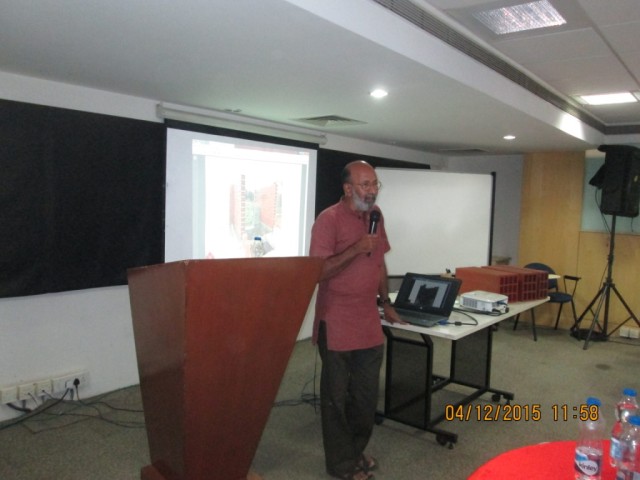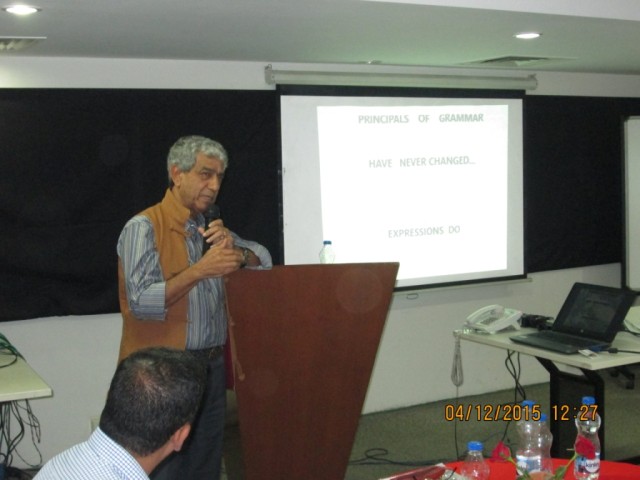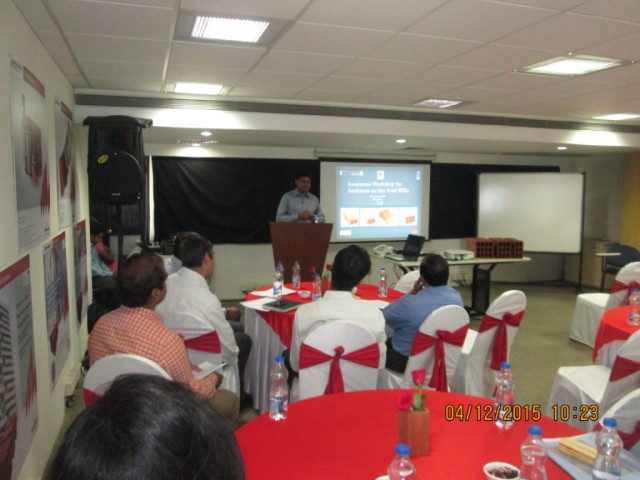Bangalore – Dec 7, 2015
The Energy Research Institute, also known as TERI, organized a workshop on 4th of December, on the importance of Clay-fired, Resource Efficient Bricks (REBs) and discussed how the effective use of REBs can potentially go along way in creating a sustainable means of constructing buildings- both environment friendly and cost effective. The workshop took place at Wienerberger India’s (the largest REB manufacturer in the country) Head Office in Bangalore and was attended by guests from the Architect fraternity, clay bricks manufacturers and developers.



The majority of Clay-fired brick production, in India, is in the form of solid bricks. One of the important reasons for reluctance by brick kiln entrepreneurs to produce REBs is the lack of market demand for the product. Recognizing this gap, and to address this issue, TERI organized an awareness workshop for architects on 4th December 2015 at Bengaluru under the UNDP-GEF brick project “Energy Efficiency Improvements in Indian Brick Industry”.
Distinguished architects like Ar.Jaism from Jaism Fountain Head and Ar.Sathya Prakash Varanasi from Sathya Consultants spoke on the benefits of trusting clay as a natural and eco-friendly alternative building material and the importance of Resource Efficient Bricks for building houses.
According to Ar.Jaism “The country cannot continue to take the environment for granted and soon the REB bricks would be the future of construction in India”. According to Ar. Sathya Prakash who had been using REB s for decades, said “REB as a concept is not really new, and it has been in existence for many years .The best part of the brick is that it is adaptable and flexible for any aesthetic design requirement for buildings.”
Sustainable construction materials
TERI has been actively involved in improving energy efficiency in Indian Brick industries. The workshop had been designed to promote knowledge with regard to the need and benefits of implementing environmentally sustainable concepts in the construction industry.
In India, century old methods of manual preparation of clay, moulding and firing are employed by brick makers while the manufacturing process has undergone a sea change in the developed countries with the adoption of semi to full mechanization and production of energy efficient products like Resource Efficient Bricks (REBs) e.g. hollow bricks and perforated bricks. In developed countries, REBs have replaced conventional solid bricks in a large way, resulting in substantial savings in consumption of top soil and fuel, besides improvement in the quality of products. REBs have further led to energy saving by way of better insulation of buildings with reduced electricity consumption for heating and cooling needs.
Mr. Kundan Dighe, Product Development Head, Wienerberger India said, “Although brick manufacturing is seen by many factions as not-so-environmental friendly because of their dependence on clay, yet clay can be excavated in a eco friendly manner by implementing scientific best practices like Wienerberger does. Clay used for Porotherm Smart Bricks are obtained from de-silting of clay tanks without having any adverse environmental impact on the surrounding top soil. No agricultural land is used for this purpose either…”
According to Mr. Monnanda Appaiah, Managing Director, Wienerberger India, “Fired Clay REBs bring in exceptional value from an environmental and sustainable perspective and also bring considerable design flexibility to Architects & structural consultants, savings for builders life long healthy living spaces for the end user…”
Apart from creating awareness about REBs and the stressing the need to use them, the workshop also gave a platform for developers who have used such bricks to narrate their experiences from an application perspective.
Mr.Siddhanth from Value Design Build (VDB) Builders showcased an ongoing project – The Living Walls, wherein Porotherm Smart Bricks are used for the entire project, as a case study on how they had benefitted from the use of such walling material. According Mr. Siddhanth and Mr.Srinivasa from VDB, they managed to save 7 to 10% of structural load because of the light weight of Porotherm bricks.
Another important observation made by VDB’s Mr.Siddhanth was that water used in construction is not yet seen as exploitation of natural resource because of the availability of bore wells at construction sites, however water obtained from depths below 100 mts ceases to be ground water and is more of fossilized water,which had taken thousands of years to form…hence mass utilization of suchwater can have very damaging impact on the environment. With Wienrberger’s Dryfix system, there is absolutely no need of water for masonry ;thus not only saving money for the builder, but also protecting the natural resources.
To conclude, Mrs. Nayanika Singh, GEF Consultant and representative from the Ministry of Environment, Forest and Climate Change, remarked “REB’s have, without a doubt, irrefutable benefits and in today’s extremely challenging environment, resource efficiency in building materials should be seen as a very important requirement for the near future.”
